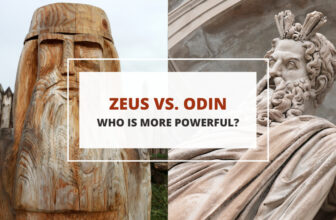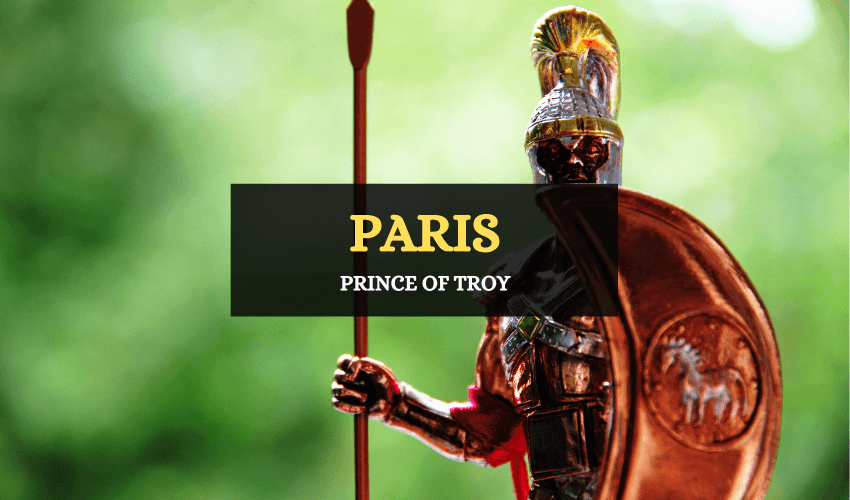
Table of Contents
Paris, Prince of Troy, is one of the most notorious characters of Greek mythology. Paris is best known as the prince of Troy who sparked the Trojan War by abducting Helen, the most beautiful woman in the world, from her husband, Menelaus, king of Sparta. He is indirectly responsible for the fall of Troy and the destruction of his family. The story of Prince Paris of Troy has many twists and turns, with much interference from the gods.
Who Was Paris?
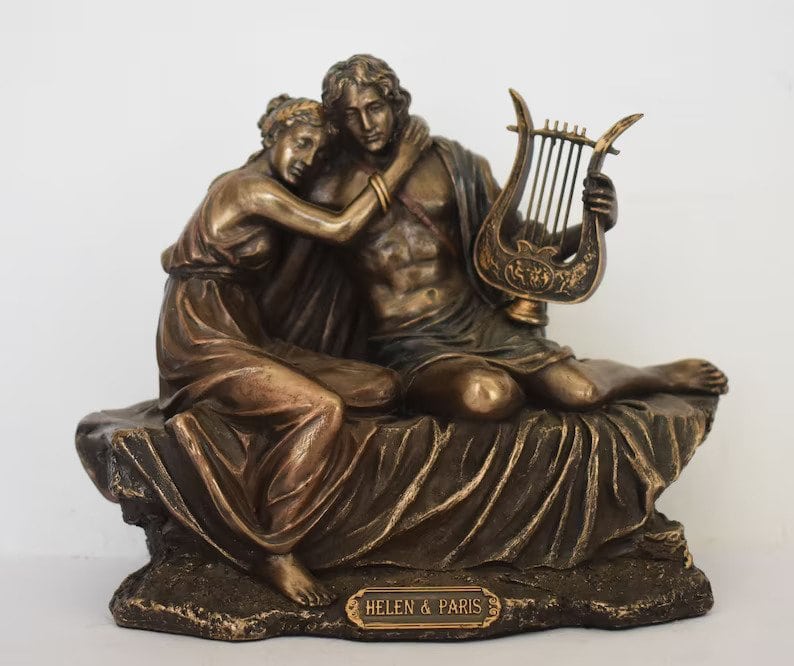
Paris was the son of King Priam of Troy and his wife, Queen Hecuba, but he did not grow up as a prince of Troy.
- Hecuba has a premonition.
When still pregnant for Paris, Hecuba had a dream that her still-to-be-born child was born as a burning torch. Disturbed by the dream, she visited the seer Aesacus to learn what it meant. The seer explained that it was a prophecy that said that her son would cause the destruction of Troy.
Aesacus said that on the day that Paris was born, they had to kill him immediately to ensure the salvation of the city. King Priam and Hecuba could not do such a thing, so they requested a herdsman to take the boy to Mount Ida and kill him. The herdsman also could not kill Paris and left him to die on the mountain top.
- Paris survives.
Paris managed to survive being abandoned. Some myths say that he did so by drinking milk from a bear as one of her cubs. The herdsman returned to Mount Ida nine days later, hoping to find the dead body of Paris, but discovered something else: Paris was still alive. He took the survival of the boy as a divine act from the gods and decided to take Paris with him. The herdsman raised him as his son, and Paris grew unaware of his true identity.
- Paris as a shepherd.
The noble ancestry of Paris was hard to hide since he was extraordinary in almost every task he took on. He became an excellent shepherd and even managed to rescue his cattle from some thieves. His actions caused people to call him Alexander, which stands for the protector of men. Eventually, the nymph Oenone of Mount Ida fell for Paris due to his astonishing feats.
Oenone was a fantastic healer, taught by Apollo and Rhea, and she could heal almost any injury, regardless of how serious it was. She promised Paris to always take care of him. Oenone may have known who Paris was, but she never told him. In the end, Paris left her for Helen of Sparta.
- Paris as a just and impartial man.
One of Paris’ main pastimes was to arrange contests between the bulls of his cattle and the bulls of other herdsmen. According to the myths, the bulls of Paris were amazing creatures, and he won all the contests. The god Ares decided to transform himself into an amazing bull to defeat Paris’ cattle. When the time came to determine the winner, Paris did not choose his bull. He chose the other one for its merits, without knowing it was Ares. This decision caused the gods to consider Paris an impartial, just, and honest man.
- Paris returns to the court of Troy.
According to some sources, Paris entered a boxing contest as a young man in a Trojan Festival. He was the winner after having defeated the other sons of King Priam. His win revealed his identity, and he returned home to become a prince of Troy.
The Judgment of Paris

The main story of Paris begins with what was essentially a beauty contest among the goddesses. Due to Paris’ impartiality, Zeus asked for his help to decide on a conflict between the goddesses Hera, Aphrodite and Athena. This happened during the famous wedding ceremony of Thetis and Peleus.
On Mount Olympus, all the gods had been invited to the big wedding celebration of Thetis and Peleus. However, Eris, the goddess of discord, hadn’t been invited. The gods had decided not to tell her about the wedding, since she could cause trouble at the wedding.
Eris was offended and managed to disrupt the wedding anyway. She threw a golden apple from the Garden of the Hesperides on a table and said that the apple was for the fairest goddess present. Three goddesses claimed the prize: Aphrodite, Athena, and Hera.
They asked Zeus to decide who the winner of the contest was, but he did not want to intervene in the conflict. Therefore, he appointed Paris as the judge. Paris, however, could not decide, and the goddesses started offering gifts to influence his decision.
Hera offered Paris the rule over Europe and Asia. Athena offered him battle skills and wisdom for war. Lastly, Aphrodite offered him the most beautiful woman on earth. Paris picked Aphrodite as the winner of the contest, and the most beautiful woman on earth was his to claim. This woman was Helen of Sparta.
There was just one problem with the whole thing. Helen was already married to King Menelaus of Sparta.
The Oath of Tyndareus
Meanwhile, due to Helen’s beauty, several suitors had wanted to marry her, and all of them were great kings or warriors of Ancient Greece. In this sense, the possibility of conflict and bloodshed was high. Helen’s father, King Tyndareus of Sparta, created an oath that bound all the suitors to accept and protect the marriage of Helen with whomever she selected. That way, if anybody tried to cause a conflict or take Helen, they all would have to fight on behalf of Helen’s husband. This oath would be the cause of the War of Troy once Paris had taken Helen from Sparta.
Helen and Paris
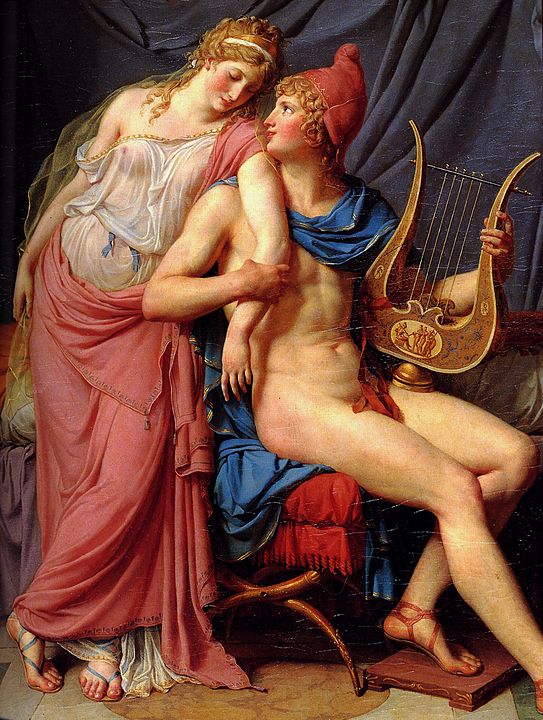
In some myths, Helen fell in love with Paris thanks to Aphrodite’s influence, and they fled together one night when her husband was away. In other accounts, Paris took Helen by force and fled the city without being spotted. Either way, he took Helen with him, and they got married.
When Menelaus found out what had happened, he invoked the Oath of Tyndareus. All the kings and warriors who had taken the oath, pledged to rescue Helen from Troy and bring her back to her rightful place in Sparta.
The Trojan War
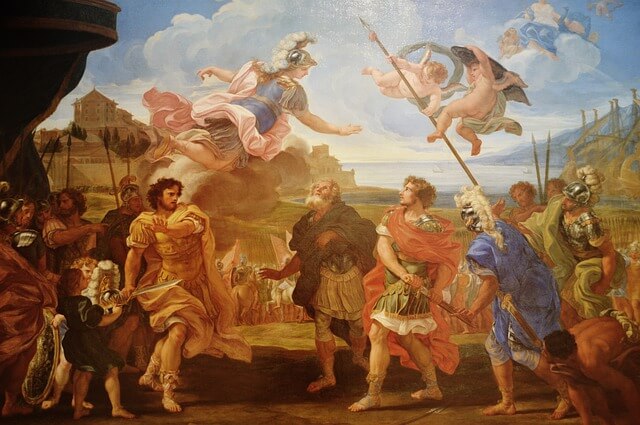
Despite the requests of Menelaus and the Greek army for Paris to return Helen, the Trojans refused, and she stayed on. The role of Paris in the war was not as important as that of his brothers. Yet, his taking of Helen was the beginning of it all. Paris was not a skilled fighter, and he preferred to use the bow and arrow. Due to this, most people thought of him as a coward, although his archery skills were deadly.
- Paris and Menelaus
Paris agreed to fight against Menelaus to decide the fate of the war. Menelaus easily defeated Paris, but before the King of Sparta took the last blow, Aphrodite rescued Paris and took him to safety. Had this not happened, the Trojan War would have ended before it had even begun and thousands of lives would have been spared.
- Paris and Achilles
Paris was the one to kill the great Greek hero Achilles. In one of the final battles, Paris shot an arrow at Achilles and hit him directly in his heel, his only vulnerable point.
In some accounts, the god Apollo directed the arrow so that it would hit Achilles in the heel, causing his death. Apollo did this as an act of revenge because Achilles had dishonored one of his temples by killing people inside it. Either way, people would remember Paris as the killer of the most ferocious of the Greek warriors.
The Death of Paris
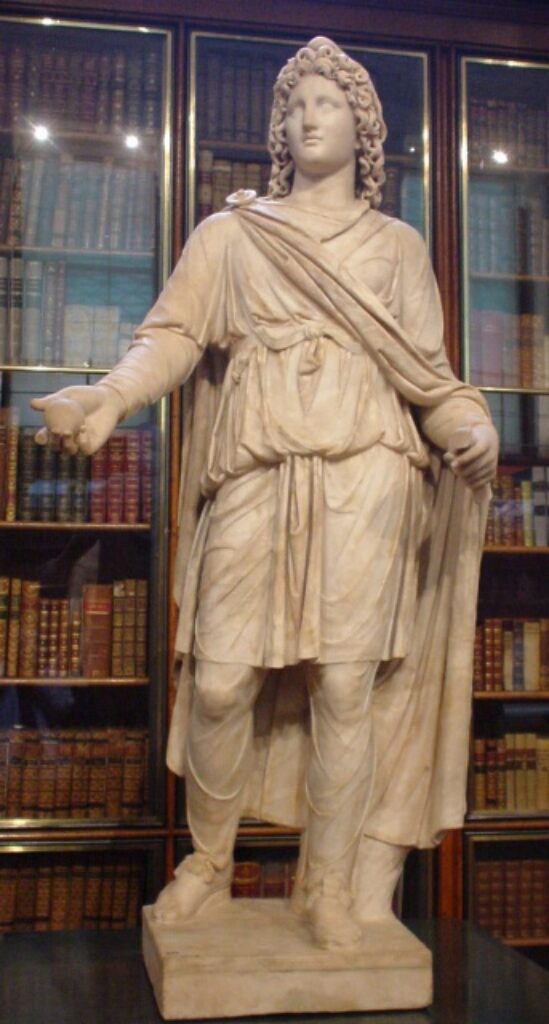
The war did not end with the death of Achilles, and in a future battle, Philoctetes mortally wounded Paris with one of his arrows. In despair, Helen took Paris to the nymph Oenone, so that she could heal him but she refused. Paris eventually died of his wounds, and Helen remarried, this time to Paris’ brother, Deiphobus.
Some myths say that Oenone felt so distraught at the death of Paris that she jumped to his funeral pyre and died with him. After the city of Troy fell, Menelaus would kill Deiphobus and take Helen back with him.
Why Is the Story of Paris Important?
Paris’s decision to elope with Helen, the wife of Menelaus, king of Sparta, directly led to the outbreak of the Trojan War. His actions brought together the major Greek states in a united effort to retrieve Helen. In this way, he was instrumental in shaping the geopolitical landscape of the era in mythological terms.
The figure of Paris, often depicted as a handsome but somewhat effete youth, has been a recurring subject in classical and post-classical art and literature. His romantic escapade with Helen, as well as his pivotal role in the war, has inspired countless adaptations, retellings, and reinterpretations, cementing his position in Western cultural consciousness.
In Brief
Like many other figures in Greek mythology, Paris could not escape his fate and he brought doom to his city. He remains one of the most well-known figures of Greek mythology, but he comes across as a selfish, impulsive, and reckless character, whose actions would cause the destruction of his people.
Related articles
The Power of Poseidon: Greek God of the Sea
Cronus: Rise and Fall of the Great Titan Ruler
Persephone: Greek Goddess of Spring and the Underworld
King Midas: The Golden Touch in Greek Mythology
Greek Goddess Athena: Her Origins, Symbols, and Influence






